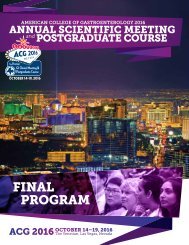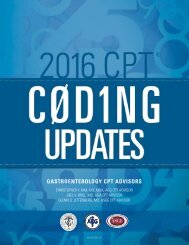fC6MQX
fC6MQX
fC6MQX
- No tags were found...
You also want an ePaper? Increase the reach of your titles
YUMPU automatically turns print PDFs into web optimized ePapers that Google loves.
ACG’s 2014 Educational Programs — Needs Assessmentadverse side effects. Also, within the next 1-2 years, therapy will likelybe completely all-oral, interferon-free, and perhaps even ribavirin-free.There will be a series of new regimens available, with new ones beingintroduced at a very rapid pace. Because there will be simple and effectivetherapies available, there will likely be more gastroenterologists whoare willing to treat HCV. For this reason, ACG must work to educate gastroenterologistsabout the current and upcoming treatments. Also, withthe expected rapid development and approval of multiple regimens,ACG must work to have a mechanism in place to allow rapid changesand/or addendums to HCV treatment guidelines.PancreaticobiliaryPancreaticobiliary diseases can also be extremely challenging to manage,and can vary greatly in complexity and severity. Gastroenterologistsplay an essential role in both the evaluation and the managementof patients with pancreaticobiliary disorders. Cystic neoplasms of thepancreas are more frequently diagnosed and management guidelineshave been updated recently as our knowledge base continues to grow.Gastroenterologist offer highly specialized care for such patients, includingadvanced interventional endoscopic procedures. As endoscopictechnology advances, patients are simultaneously becoming morecomplex, making it essential that gastroenterologists are up-to-date onthese management techniques and strategies. Education on the diagnosisand management of various forms of pancreaticobiliary diseaseincluding pancreatitis, pancreatic cysts, pancreatic cancer, and biliarydisorders is critical to obtaining the best patient outcomes.Functional GIImprovements in the understanding of the pathogenesis and treatmentof motility and functional GI disorders continue to progress as researchin this area expands. These disorders are among the most common GIdisorders in the general population. Understanding the latest sciencewith regard to these disorders and newer treatment modalities is criticalto improving clinical outcomes and quality of life for a large group ofpatients who have been among the most difficult to treat. Understandingthe potential role of enteric microbiota and inflammation in thesedisorders will also help determine the appropriate course of action andplay a critical role in managing these challenging conditions.Diarrheal disorders can prove to be challenging to diagnose andmanage. Whether it be acute or chronic, caused by a malabsorptivecondition, inflammatory, or infectious process, gastroenterologists mustbe aware of the various potential causes of diarrhea and the mostappropriate corresponding treatment options. With the incidence andseverity of Clostridium difficile infections increasing in recent years, thisis yet another condition that demands close attention by the gastroenterologist.GI BleedingGI bleeding remains one of the most common yet most challengingissues confronted by the clinical gastroenterologist. New anticoagulantshave been released in the last several years, and this new class ofdrugs has made patients with GI bleeding even more difficult to treat.It is critical that gastroenterologists are frequently updated on thesenew medications as these patients may require different managementstrategies than those who are on traditional anticoagulants. Whether theGI bleeding is related to drug therapy, stress ulceration in the intensivecare unit, anticoagulation, chronic liver disease, or obscure gastrointestinalbleeding, the gastroenterologist must be up to date on the latestinformation on strategies to prevent, diagnose, and optimally treat GIbleeding.GERDGastroesophageal reflux disease is a common condition world-wide andaffects 20% of American adults on a weekly basis. An understandingof its pathophysiology, diagnosis, treatment options, and complicationsis extremely important for the practicing gastroenterologist, andnew guidelines have been published on reflux within the past year.While less common, eosinophilic esophagitis appears to be increasingmarkedly in incidence and has been the subject of intense researchleading to recent clinical guidelines. Esophageal dysmotility remains anongoing challenge, and this field has dramatically changed in the pastseveral years due to the adoption of new diagnostic modalities and anoutpouring of outcomes data. This has been particularly significant forachalasia, which also has been the subject of recent consensus guidelineswithin the past year. Other upper GI conditions including Barrett’sesophagus, dyspepsia, peptic ulcer disease, and H. pylori also requirea clear understanding. It is important that published evidence-basedpractice guidelines for these upper GI conditions and many other identifiedGI disorders be available to the gastroenterologist for their explicitunderstanding and to enhance their ability to most effectively manageeach of their patients. With guidelines published on gastroesophagealreflux disease, eosinophilic esophagitis, and achalasia withinthe last year, this has been an active area and this new informationneeds to be disseminated to the gastroenterology community.EndoscopyRapid technological advancements in endoscopy and other diagnosticand therapeutic areas in gastroenterology creates a need to communicatethe latest techniques and strategies for managing everythingfrom patients with altered anatomy to identification and removalof large and difficult polyps to developing practice of natural orificetransluminal endoscopic surgery. Gastroenterologists in a variety of practicesettings need to learn and integrate these new therapies into theirpractice in order to provide state-of-the-art services to their patients.QualityFinally, it is critical that gastroenterologists incorporate quality, safety,and service metrics into their clinical practice. In particular, quality andsafety issues in the endoscopy suite need to be addressed in order toimprove patient outcomes. Other quality issues dealing with specific diseasestates and their management in the office practice also need to beaddressed by the practicing gastroenterologist. Practice efficiency is alsoof great importance as the demand for increased efficiency across allsettings continues to drive the search for practical tools to positively impactcare delivery and patient outcomes. Through the use of evidencebasedapproaches for treatment and rational public health policy, cliniciansneed to identify new and innovative ways to deliver care across thecommunity. Ever-expanding access to information on a real-time basisby both clinicians and patients provides unique opportunities as well aschallenges to the healthcare delivery system. When this is combinedwith the pressures associated with increased spending on healthcarein an environment currently trending toward decreased reimbursementand inadequate rewards for the physician who spends more time withthe patient, the importance of high-quality continuing medical educationfor gastroenterologists and their patients cannot be overstated.FACULTY DISCLOSURESThe American College of Gastroenterology (ACG) is accredited by theAccreditation Council for Continuing Medical Education (ACCME) toprovide continuing medical education for physicians. ACG, as an ACCMEaccredited provider, ensures balance, independence, objectivity, and scientificrigor in all of its directly and jointly provided education activities.All who are in a position to control the content of an education activity(including their spouse or partner) are required to disclose to ACGall relevant financial relationships in any amount occurring in the past12 months with any commercial interest that may create a conflict ofinterest related to the subject matter of an education activity. Safeguardsagainst commercial bias have been put in place by ACG. Anyone whorefuses to disclose relevant financial relationships will be disqualified.ACG ensures any conflicts of interest are resolved before the educationalactivity occurs and discloses all relevant financial relationships to thelearners prior to the beginning of an education activity.EDUCATIONALPROGRAMS9For more information on ACG 2014 and to register, visit www.acgmeetings.gi.org.




